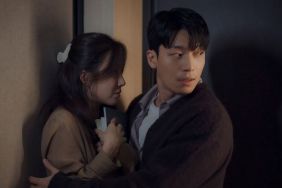Jang Dong-gun as Jin-tae Lee
Won Bin as Jin-seok Lee
Lee Eun-joo as Young Shin
Story:
As a civil war hits Korea in 1950, two brothers are drafted into the army. The older one, Jin-Tae, is overprotective of his younger brother Jin-Seok trying to keep him alive, but the rigors of the war slowly wear them down, and the resentment and jealousy builds when the older brother becomes a war hero driving a wedge between the two of them.
Analysis:
There have many amazing war movies over the years, mostly out of Hollywood, but the genre has settled down a bit now that the country has actually entered a war. Tae Guk Gi by director Kang Je-Gyu, who directed the Korean spy thriller Shiri, looks back at a war that has been forgotten both by Hollywood and most Americans, and the film couldn’t be any more timely in its look at the atrocities of war and its effects both on a country and on a family.
After World War 2, Korea was split in half with communist Russia controlling the North and the U.S. being in charge of the South, and much of the Cold War revolving around the partisanship of thiis country. In 1950, the North invaded the South causing upheaval as all able men were drafted into the South Korean army, breaking up many families.
At the center of this story are two brothers, introduced in happier times despite their lives of poverty and their attempts to get through it. When the younger brother is drafted into the army, the older brother goes against the rules that only one male can be taken from a family and goes along to protect him. Jin-Tae is the braver of the two brothers, often volunteering for the difficult missions and leading his battalion onto one victory after the next to become a bonafide war hero. The logic for taking such risks is that by earning a medal, he thinks that he can get his younger brother discharged. Instead, it causes friction between them. As things begin to fall into a rather predictable pattern of victories and personal conflicts, a sudden and unexpected twist is thrown into the mix that changes the very nature of the movie, as well as the dynamics between the brothers.
Tae Guk Gi isn’t just a touching character drama though, as it also features some of the most intense battle sequences ever put on film, an amazing achievement considering the film’s paltry (by Hollywood standards) production budget of $13 million, making it Korea’s most expensive film ever. Even with the financial limitations, Tae Guk Gi looks as good or better than most modern Hollywood war movies, and the mix of Je-Gyu’s normal violence and gore with a tightly scripted drama makes you really feel as if you’re on the frontlines. While some of the brutal violence is hard to watch, that gritty realism is what makes Tae Guk Gi so powerful.
In some ways, the film owes more to movies like Apocalypse Now and Enemy at the Gates in its political grey area of delineating the good guys and bad guys. Je-gyu’s Southern roots gives the film a slight bias towards his region, but the film’s most pivotal scenes involve the brutality shown to the North Korean captives by the Southern troops, despite some of them being former friends forced to fight for the North. Je-guy makes it clear that both sides of the war were guilty of committing atrocities against their fellow men, creating a hard-edged political subtext to the movie that parallels how communism was handled in our country during the McCarthy Era.
While the battle reenactments are jaw dropping, the real story is how the relationship between the two brothers is affected by the war and the breakdown of their country. The transformation of the soldiers from inexperienced and naïve kids into ruthless kids is mirrored by the change in the two brothers in two fantastic performances. While Jan Dong-Gun is more of the classic Hollywood heroic lead, Won Bin is even more amazing as the younger brother, since he becomes almost unrecognizable over the course of the film from the idealistic, naïve boy of the film’s opening.
At two and a half hours, the movie is excessively long and a few of dramatic scenes are overly sentimental, coming dangerously close to Steven Spielberg territory. For example, when the brothers’ mother chases their train down the tracks, it’s just a bit too much. Other than that, those moments help build a connection between the audience and the two brothers and give a better idea what Korean family life was like at the time.
Because of the length and the violence, the movie won’t be for everyone, but it’s no surprise that Tae Guk Gi reigned over the Korean box office for many weeks becoming one of the country’s biggest box office hits, and I wouldn’t be at all surprised if it gets an Oscar nomination in the foreign language category.
The Bottom Line:
The last thirty or forty years have seen many memorable war movies from Hollywood power players from Francis Ford Coppola’s Apocalypse Now to Steven Spielberg’s Saving Private Ryan and Ridley Scott’s Black Hawk Down. Kang Je-gyu’s Tae Guk Gi is on the same level as most of them in terms of story, characters and the realistic wartime action. Encapsulating all aspects of war in a realistic way, Kang Je-gyu has created a powerful yet personal look at a war that few outside his native country may even remember.










